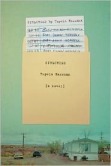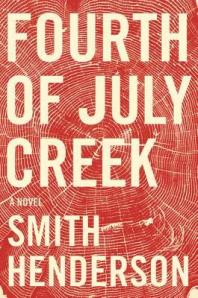I know. I know. Everyone and their brother has a “Best of” list at this time of year, but this tradition of mine predates blogging. This is just a more convenient way to share.
Readers should keep in mind that I don’t limit myself to books released in 2012. Although I try to keep up with what’s new and hot, I’m just as likely to pick up an unread classic or finally get around to reading something I’ve had on my list for months (or years). So you’ll find a mix of old and new.
And, I just couldn’t decide which book to cut from the list, so here you have my Top 11!
 Tell the Wolves I’m Home by Carol Rifka Brunt
Tell the Wolves I’m Home by Carol Rifka Brunt
Tell the Wolves I’m Home is everything I love in a book – a thoughtful, socially awkward young narrator coming of age at a particularly dramatic historical moment. June Elbus is 14 years-old in 1986 when her beloved uncle dies of AIDS. June is caught between childish games of imagination and the harsh realities of death, fear and discrimination. Struggling with the love-hate relationship between herself and her 16 year-old talented and popular sister, feeling orphaned by her busy-at-work parents and full of teenage self-loathing, she still comes across as tender and sympathetic. Read more…
 Extremely Loud and Incredibly Close by Jonathan Safron Foer
Extremely Loud and Incredibly Close by Jonathan Safron Foer
Brilliant. Devastating. Can a book be described in two words? Probably not, but 2,000 will not be enough to convey the depth and intelligence of this masterpiece. Certainly, it’s a 9/11 book. The main storyline revolves around Oskar, a 9 year-old boy on a quest for closure after his father’s death on that horrible day. But the book is more than that. Read more…

book cover from Goodreads
A Land More Kind than Home by Wiley Cash
Wiley Cash did not so much ease me into the disturbing world of his novel, as grip me by the throat and pull me along. Within the first few pages I knew to be very afraid of the charismatic, snake-handling, strong-arming Carson Chambliss. I knew someone had died. I knew children were involved. And I felt the heart-wrenching isolation of the people in this Appalachian community through the eyes of Adelaide, an elderly midwife. In fact, as the novel opens, Adelaide is about to step into Chambliss’ church and meet him face to face. Read more…

cover image from Goodreads
Gone Girl by Gillian Flynn
I find it difficult to review this book without giving the whole thing away. Any spoilers would ruin this brilliantly crafted novel by literary “It Girl” Gillian Flynn. So let me say instead that Flynn has forced me to completely re-examine my belief that I’m not a fan of thrillers. What starts out as a straightforward premise – woman goes missing on her 5th wedding anniversary; husband is primary suspect – twists and turns in so many directions that I was left guessing, often. Read more…
 Rules of Civility by Amor Towles
Rules of Civility by Amor Towles
I cannot possibly write a review that reflects the intelligence and sophistication of this book. Integrating art, photography and literature into his portrait of 1938 New York, Amor Towles also tells a great story about the choices made by one young woman — Kate/Katey/Katherine Kontent, and her friends. Kate is smart, funny, unpredictable and determined, all qualities that make a fine heroine. But she’s also imperfect, which makes her infinitely more interesting. Read more…
 The Sense of an Ending by Julian Barnes
The Sense of an Ending by Julian Barnes
The Sense of an Ending is further proof that my favorite books are not those that are driven by plot, or even by character, but instead, are books whose language transports me. I don’t mean to imply that nothing happens or that I didn’t care about the characters, but they aren’t the critical elements in my 5 star rating for this book. What elevates Julian Barnes to 5 star status is the way he makes me think. Read more…

Cover image from Goodreads
Girlchild by Tupelo Hassman
Raw.
To love Girlchild as much as I did, you have to be willing to understand “raw.” Several times while I was reading this book, my husband looked at my face and asked me what was wrong. (I was alternating between tears brimming over and horror leaving my mouth agape.) Rory Dawn suffers neglect, mistreatment and abuse at the hands of those trusted to care for her. Growing up in a Nevada trailer park outside Reno, Rory clings to her tattered copy of the Girl Scouts Handbook as the only set of rules that use “honor” and “obey” as positive edicts. Read more…
 This is Where I Leave You by Jonathan Tropper
This is Where I Leave You by Jonathan Tropper
I can’t remember the last time a book made me laugh out loud, but this one did. It also made me blush, got me a little choked up at times, and introduced me to another author whose work I will actively seek. Forced to take part in a traditional Jewish 7-day shiva for his father, Judd Foxman ping-pongs between his hilariously dysfunctional siblings, his larger than life newly widowed mother, and the agony of his failed marriage. Read more…
 Beautiful Ruins by Jess Walter
Beautiful Ruins by Jess Walter
Beautiful Ruins defies easy categorization. A little bit mystery, a little romance, a little historical fiction, even a little Hollywood. Jess Walters does a fantastic job of blending all these components into something smart, entertaining and lovely. What I really loved is the way Walters carried me away to another world, another time. He puts me squarely inside the minds of his characters so that I’m on the journey with them. The characters themselves are the beautiful ruins of this novel. Read more…
 Unless by Carol Shields
Unless by Carol Shields
Although Carol Shields’ novel has a tragic background, it doesn’t focus on a traditional story. Instead, we meet Reta Winters, whose 19 year-old daughter has chosen to sit on a busy corner in Toronto wearing a sign that reads only, “Goodness.” Reta does not take dramatic action to retrieve her daughter. She does not yell or pull her hair. Instead, she thinks and she writes. This kind of passive first-person storytelling will not work for all readers, but I loved Reta from page one. Read more…
 Anatomy of a Disappearance by Hisham Matar
Anatomy of a Disappearance by Hisham Matar
How does an author write about something/someone who no longer exists? In Matar’s case, with incredible beauty and delicacy. He words seem not so much written, as poured gently. Matar provides a touching story of a boy whose father disappears. We assume it’s a political kidnapping based on the few clues the author provides, but we don’t get all the answers — exactly Matar’s point. He wisely tells a story without depending on plot points. Read more…
Honorable Mentions: Sacre Bleu, Horoscopes for the Dead, The Art of Hearing Heartbeats, The Fault in Our Stars, Zeitoun, Stone Arabia, The Homecoming of Samuel Lake, The Perks of Being a Wallflower, Astray, One Last Thing Before I Go
 The Montana Visitors Bureau will not be hiring Smith Henderson any time soon. The Montana of Henederson’s gripping debut novel is bleak and desolate, filled with alcoholics, addicts, guns, separatists and loneliness. Even his brilliant depictions of the state’s wilderness seem hard-edged and dangerous. Henderson’s characters are beyond broken; they are fractured into tiny pieces and spinning out of control.
The Montana Visitors Bureau will not be hiring Smith Henderson any time soon. The Montana of Henederson’s gripping debut novel is bleak and desolate, filled with alcoholics, addicts, guns, separatists and loneliness. Even his brilliant depictions of the state’s wilderness seem hard-edged and dangerous. Henderson’s characters are beyond broken; they are fractured into tiny pieces and spinning out of control.
















